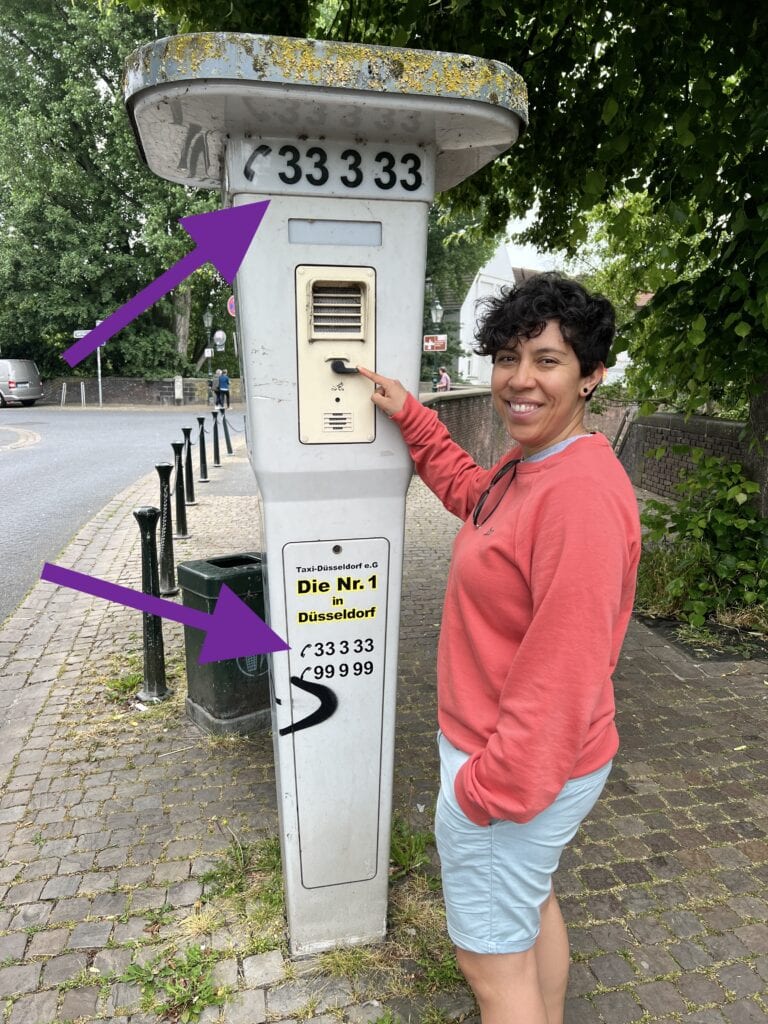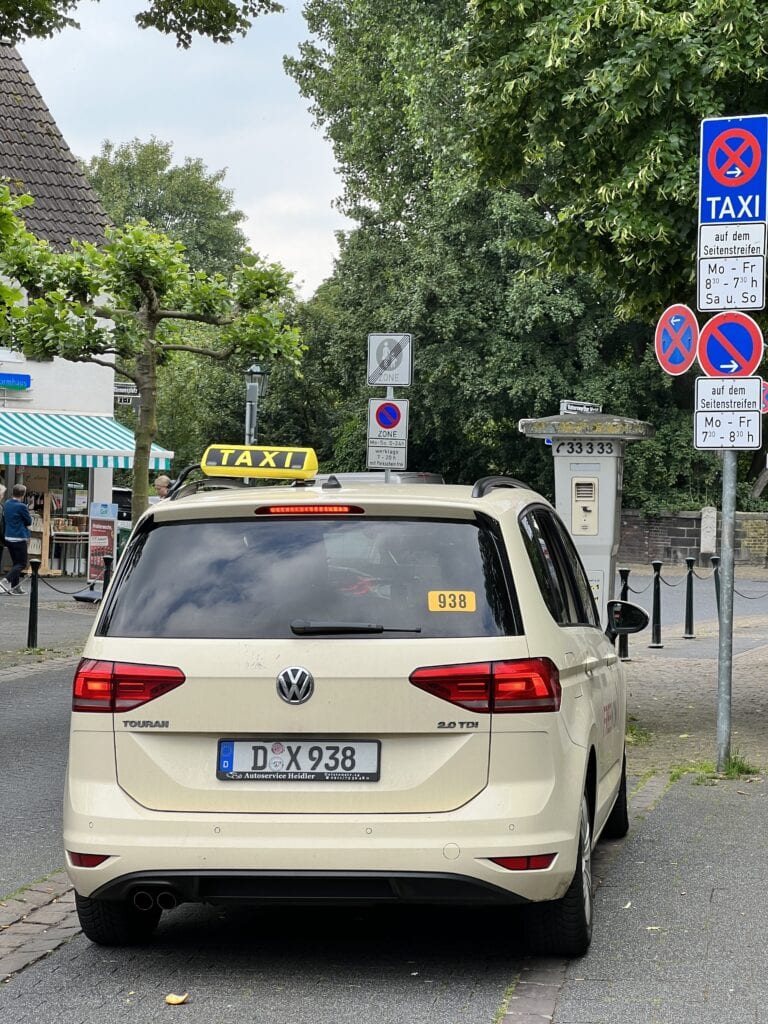Germany´s public transportation network is elaborate, yet there may be times, be it late at night, in rural areas, or when traveling with lots of luggage, when taking a taxi is the better option or simply more convenient. In this guide, you will learn everything you need to know about taxis in Germany, including how to order them, what prices to expect, and what regulations to be aware of.
How to order a taxi in Germany?
On TV, you often see people flagging down taxis on the go. In Germany, doing so will likely get you funny looks but most often not the transport you need. Here are three correct ways to order a taxi in Germany:
Option 1: At a taxi stand
If you are in a popular public space, e.g., at the airport or near a train station, taxi stands are often available, with taxis lining up to take you where you want to go. You should always approach the first taxi in the line, and then you just tell the taxi driver your destination.
Should no taxi be present, you can call the number written on the call post (Rufsäule) to call a new one. The call post itself is no longer working, as it served the pre-mobile phone era 😅.

You can spot a taxi stand by several yellow-cream colored cars lined up on the side of the street, often with parking signs indicating only taxis. Most taxis in Germany have a yellow-cream color; however, it is no longer the case that all taxis in Germany are Mercedes cars only. Nowadays, you can find pretty much any car brand as a taxi in Germany, even a Tesla, and any style of car, from limousines to station wagons to vans. All licensed taxis in Germany have a yellow taxi sign on their roof.

Option 2: Calling the taxi hotline
If there are no cabs near you or you wish to schedule a pickup, you can call the local taxi hotline. Just google taxi and your city, or ask a hotel or restaurant for the number. The numbers are commonly very catchy and easy to remember, and most operators will speak English well enough to take your order. The hotline for Rheintaxi in Düsseldorf, for example, is 0211 21 21 21, and it is available 24/7.
Calling the hotline is also the best way to order a tax in Germany if you have any special needs, e.g., a family van (Großraumtaxi) if you are 5-8 persons or have lots of luggage.
Option 3: Online
You can also book a taxi online in Germany. Most taxi companies have an online form on their website allowing you to book a cab immediately or schedule a pickup. In addition, a wide range of taxi apps let you hire a taxi easily from your smartphone.
Which mobile taxi apps exist in Germany?
If you are looking for the best taxi app in Germany, Freenow and taxi.eu are popular choices. While they both have great customer reviews overall, the most recent ones we saw on App and Play Store are more critical. When scheduling a pickup for an important event, like getting to the airport on time, especially in the wee hours, it might be better to pre-order a cab from the local licensed taxi company.
Real-life example
We usually always pre-order a Rheintaxi in Düsseldorf when we have to get to the airport before the S-Bahn starts running, and it always worked 100%. Once, I pre-ordered on Freenow during the day, and the pick-up also went smoothly. However, the one time we pre-ordered on Freenow for a 4 am pick-up, the taxi never showed up, even though my pre-order was confirmed. We were lucky enough that a taxi stand was nearby our house, and even at night, two cabs were on standby.
More prominent taxi companies, like Rheintaxi in Düsseldorf, also have their own app that you can use. All taxi apps work well enough when ordering a taxi for immediate pickup.
Is Uber taxi available in Germany?
Taxis in Germany are relatively expensive, so you may wonder what the cheapest taxi option in Germany would be. In many countries, Uber (or Lyft) are more affordable alternatives to traditional taxis and thus, very popular. Germany, however, upholds stringent regulations anchored in their transportation laws to protect the taxi industry from Uber and other mobility companies employing unlicensed drivers. After intense legal battles, Uber now operates in 10 German cities, including Berlin, Hamburg, Düsseldorf, Frankfurt, and Munich.
Good to know
Unlike taxis, Uber fares in Germany are not regulated. While generally slightly cheaper, Uber’s fares may rise in times of high demand, e.g., during fairs or big events. In such moments, Uber may be more expensive than regular taxis.
How much does a taxi ride cost in Germany?
Taxi fares in Germany are regulated by local districts, meaning fares do not differ between taxi companies in the same city. They can, however, vary throughout different regions in Germany. They consist of a basic charge for using the taxi, often between three to five euros, and an additional fee for the drive itself, usually between two to three euros per kilometer. So, for example, if you plan on taking a taxi from the airport to the city center in Düsseldorf, you should expect costs of about 25 euros for a 10-minute ride. This consists of a base fare of currently 4,50 euros and an additional fare of currently 2,20 euros per kilometer, according to the Rheintaxi website.
Do you tip taxi drivers in Germany?
Yes, it is common to tip taxi drivers in Germany. A tip of 10% on the bill is appropriate, just like in restaurants.
Read Our Related Guide
Do taxis in Germany take credit cards?
It may be surprising that many taxis in Germany only accept cash payments. Card payments have become more common in recent years but may only be available for German Giro cards, not credit cards. If paying by credit card is possible, keep in mind that Visa and Mastercard are standard in Germany. American Express is often not accepted. Always check with the driver or taxi company which payment options are available before you board the taxi to avoid unpleasant surprises.
Are children and dogs allowed in taxis in Germany?
Both children and dogs are allowed in taxis at no extra charge. As long as your dog is not aggressive or exceptionally dirty, you cannot be denied a ride for bringing it along. However, as fear of dogs or pet hair allergies may pose a safety risk, taxi drivers may refer you to a different taxi if one or both applies to them. When ordering a taxi, mention that you plan on traveling with a dog to be on the safe side.
Kids younger than twelve are legally required to use a car seat. While seats for older children are often kept in taxi trunks, car seats for babies and toddlers are too bulky to be stored. Some taxi companies have family-friendly cabs available on call, but others will require families to bring their own car seat when traveling with small children. Best call ahead to find out which applies to you.
We hope we have given you a better understanding of how taxis in Germany work, and we wish you a pleasant ride!





